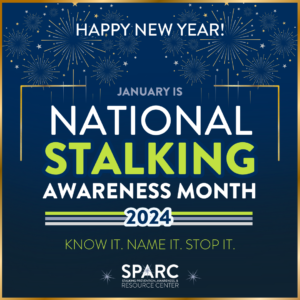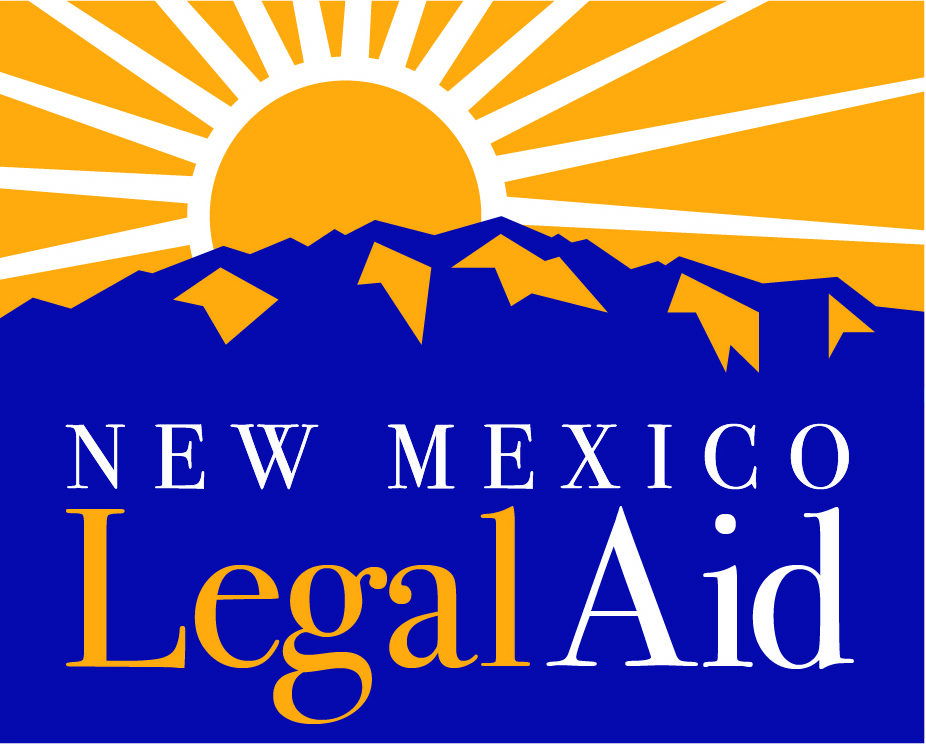January Is National Stalking Awareness Month
New Mexico Legal Aid Launches Community Awareness Campaign on Stalking
 January 2024 marks the twentieth annual National Stalking Awareness Month (NSAM), an annual call to action to recognize and respond to this criminal, traumatic, and dangerous victimization.
January 2024 marks the twentieth annual National Stalking Awareness Month (NSAM), an annual call to action to recognize and respond to this criminal, traumatic, and dangerous victimization.
Stalking impacts nearly 1 in 3 women and 1 in 6 men in the United States[i] but too often goes unrecognized and unaddressed. It takes all of us – advocacy and support services, legal systems, and victims/survivors and their friends and family – to better recognize and respond to stalking. This month, New Mexico Legal Aid invites you to join our efforts to spread awareness about stalking through the theme “KNOW IT, NAME IT, STOP IT.”
Stalking is a dangerous and devastating victimization in its own right and often intersects with physical and sexual violence. Stalking increases the risk of intimate partner homicide by three times,[ii] and 1 in 5 stalkers use weapons to threaten or harm victims.[iii] Survivors often suffer anxiety, social dysfunction, and severe depression as a result of their victimization, and many lose time from work and/or relocate.[iv],[v]
Stalking can impact every aspect of a survivor’s life, yet many victims, families, service providers, criminal and civil justice professionals, and the general public underestimate its danger and urgency. The vast majority of victims tell friends or family about their situation first, and how we respond influences whether they seek further help or not.
Stalking is defined as a pattern of behavior directed at a specific person that would cause a reasonable person to feel fear or emotional distress. Individual incidents in the pattern may or may not be criminal acts.
As fear is highly personal, so is stalking; stalkers often engage in behaviors that seem benign to outsiders but are terrifying in context. For example, many people would welcome an unexpected flower delivery, but when a victim has quietly relocated to escape a stalker, that flower delivery can be a terrifying and threatening message that the offender has found them. Most stalkers target people that they know, and the majority of stalkers are intimate partners or acquaintances who often have intimate knowledge about the victim’s vulnerabilities and fears.[vi]
Most stalkers use technology and in-person tactics to watch, contact, threaten, sabotage, and/or otherwise frighten their victims.[vii] Common stalking tactics include unwanted calls/texts/emails/messages, showing up uninvited, spreading rumors, and being followed and watched.
NSAM’s theme of “Know It. Name It. Stop It.” is a call to action for everyone in New Mexico and across the country. “We all have a role to play in identifying stalking, intervening when necessary, and supporting victims and survivors,” said Sarah Coffey, Victim Services Managing Attorney at New Mexico Legal Aid.
New Mexico Legal Aid is calling on everyone in New Mexico to join efforts to raise awareness around stalking this month – learn how to get involved with NSAM and the Day of Action of January 18th at www.StalkingAwareness.org.
New Mexico Legal Aid Domestic Violence, Sexual Assault and Stalking Helpline Statewide:
The New Mexico Legal Aid Domestic Violence, Sexual Assault, and Stalking Helpline is a free statewide service that provides legal information, civil legal services, and referrals. There are no income eligibility or shelter requirements to receive services.
- Monday – Friday from 9:00 a.m. to 5:00 p.m.
- All calls are confidential.
- Language translation services available.
- Legal information on Orders of Protection, divorce, paternity, child support, child custody and visitation, housing, benefits, and the criminal process.
- Referrals to statewide service providers.
- Victims, friends, family members, advocates, case managers, and attorneys are welcome to call.
- New Mexico attorneys available to help you on a case-by-case basis.
To access the Domestic Violence, Sexual Assault and Stalking Helpline, call toll free 1-877-974-3400 or email helpline@nmlegalaid.org.
[i] Smith, S.G., Basile, K.C., & Kresnow, M. (2022). The National Intimate Partner and Sexual Violence Survey (NISVS): 2016/2017 Report on Stalking. Atlanta, GA: National Center for Injury Prevention and Control, Centers for Disease control and Prevention.
[ii] Spencer, C.M. & Stith, S.M. (2018). Risk Factors for Male Perpetration and Female Victimization of Intimate Partner Homicide: A Meta-Analysis. Trauma, Violence, & Abuse 21(3): 527-540.
[iii] Mohandie, K., Meloy, J.R., McGowan, M.G., & Williams, J. (2006). The RECON Typology of Stalking: Reliability and Validity Based upon a Large Sample of North American Stalkers. Journal of Forensic Sciences, 51 (1), 147-155.
[iv] Blaauw, E., Arensman, E., Winkel, F.W., Freeve, A., & Sheridan, L. (2002). The Toll of Stalking. Journal of Interpersonal Violence 17(1): 50-63.
[v] Baum, K., Catalano, S., & Rand, M. (2009). Stalking Victimization in the United States. Washington, DC: Bureau of Justice Statistics.
[vi] Smith, S.G., Basile, K.C., & Kresnow, M. (2022). The National Intimate Partner and Sexual Violence Survey (NISVS): 2016/2017 Report on Stalking. Atlanta, GA: National Center for Injury Prevention and Control, Centers for Disease control and Prevention.
[vii] Truman, J.L., & Morgan, R.E. (2021). Stalking Victimization, 2016. Washington, DC: US DOJ, Bureau of Justice Statistics, Special Report.

